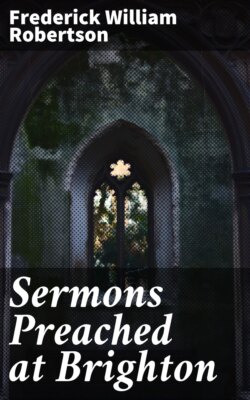Читать книгу Sermons Preached at Brighton - Frederick William Robertson - Страница 8
На сайте Литреса книга снята с продажи.
2. The tyranny of the sensual.
ОглавлениеI call it tyranny, because the evidences of the senses are all powerful, in spite of the protestations of the reason. In vain you try to persuade the child that he is moving, and not the trees which seem to flit past the carriage—in vain we remind ourselves that this apparently solid earth on which we stand, and which seems so immoveable, is in reality flying through the regions of space with an inconceivable rapidity—in vain philosophers would persuade us that the colour which the eye beholds, resides not in the object itself, but in our own perception; we are victims of the apparent, and the verdict of the senses is taken instead of the verdict of the reason.
Precisely so is it with the enjoyments of the world. The man who died yesterday, and whom the world called a successful man—for what did he live?—He lived for this world—he gained this world. Houses, lands, name, position in society—all that earth could give of enjoyments—he had: he was the man of whom the Redeemer said that his thoughts were occupied in planning how to pull down his barns and build greater. We hear men complain of the sordid love of gold, but gold is merely a medium of exchange for other things: gold is land, titles, name, comfort—all that the world can give. If the world be all, it is wise to live for gold. There may be some little difference in the degree of degradation in different forms of worldliness; it is possible that the ambitious man who lives for power is somewhat higher than he who merely lives for applause, and he again may be a trifle higher than the mere seeker after gold—but after all, looking closely at the matter, you will find that, in respect of the objects of their idolatry, they agree in this, that all belong to the present. Therefore, says the Apostle, all that is in the world—“the lust of the flesh, the lust of the eye, and the pride of life, is not of the Father, but of the world,” and are only various forms of one great tyranny. And then when such a man is at the brink of death, the words said to the man in our Lord's parable must be said to him. “Thou fool, the houses thou hast built, the enjoyments thou hast prepared; and all those things which have formed thy life for years—when thy soul is taken from them, what shall they profit thee?”
